Legacy of Healing hosts coastal jam in observance of National Domestic Violence Awareness Month
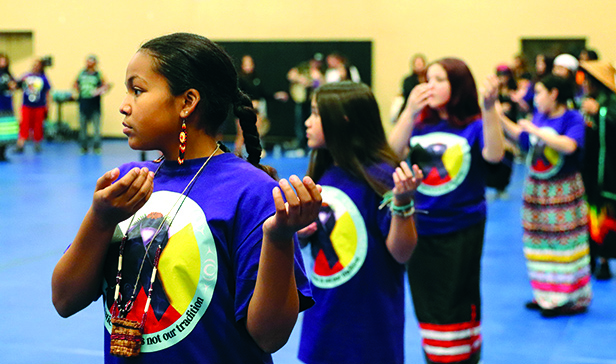
By Kalvin Valdillez, Tulalip News
“For many of our families there are silent wars happening in their homes,” said Jade Carela, Director of the Tulalip Legacy of Healing. “Our homes are supposed to be a place of comfort, but for victims of domestic violence they are a battlefield on which the person they love and trust is doing the unthinkable to them.”
A sea of purple washed over the community of Tulalip on the evening of Friday October 6. Signs were posted throughout the teen center campus, displaying messages such as, ‘I am not what happened to me. I am what I choose to become.’ And though the people were happy to gather together, there was a somber tone in the atmosphere, which indicated the seriousness of the event.
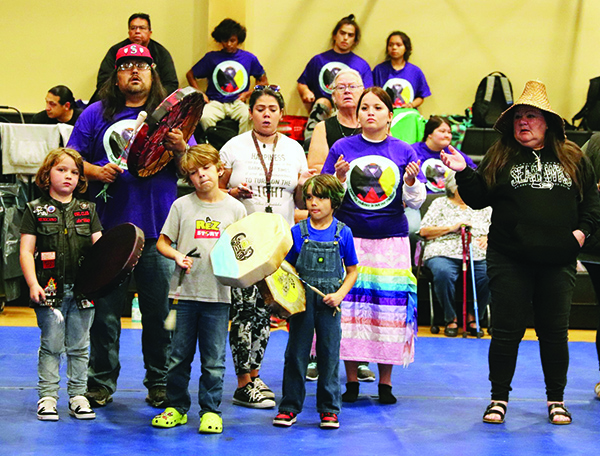
Taking part in a nationwide initiative, the Tulalip Legacy of Healing organized a night of culture to help spread awareness about a subject that may be uncomfortable to talk about, but must be addressed because of how often it occurs, especially within Native America.
The Legacy of Healing is a program that is designed to help support the local victims and survivors of domestic partnerships in several capacities, whether it’s just to supply inquiring minds with information and resources, or be in your corner throughout the court process, or even design a safety plan with you for when you’re ready to leave an abusive relationship.
Over the years, the program has increased its visibility in hopes to reach more local women and men who are experiencing domestic violence in their home lives. October has been a busy month each year for the Legacy of Healing as they’ve brought education, resources, and support to the community by participating in National Domestic Violence Awareness Month. Through a number of events and cultural/group activities, the Legacy of Healing has shown up for many DV survivors and victims of the community and walked alongside them through difficult times, letting them know they are supported, loved, and not alone.
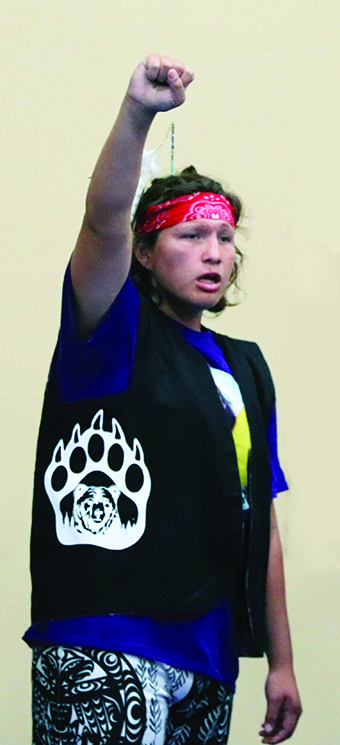
While engaging their participants and clients in activities and open discussions, the Legacy of Healing has provided many opportunities for people to learn about DV each October. That alone is extremely important because many are not able to recognize domestic violence as it’s occurring. And this is due to the fact that the majority of folks have misconceptions about what DV is exactly, and they do not realize that there are numerous ways an abuser asserts control and power in a relationship, including isolation, gaslighting, and manipulation, among many others.
This year, the Legacy of Healing organized a dinner and a coastal jam to bring awareness on a larger scale to the people. During previous DV Awareness Months, the Tulalip culture played a big role in the healing process, and the Legacy of Healing focused in on that aspect for this year’s gathering.
The evening began with a dinner inside of the teen center at the Don Hatch gymnasium. During the dinner, attendees received t-shirts designed by Tulalip and Quileute artist, Marysa Joy Sylvester. The front of the shirt featured a purple ribbon inside of a medicine wheel, and across the bottom it read, ‘Domestic violence is not our tradition’. Purple is the official color of awareness for the month, and October 19th is ‘Wear Purple Day’, so should you choose to stand in solidarity with the local survivors of DV, make sure to don your favorite purple attire and send a selfie on over to the Legacy of Healing.
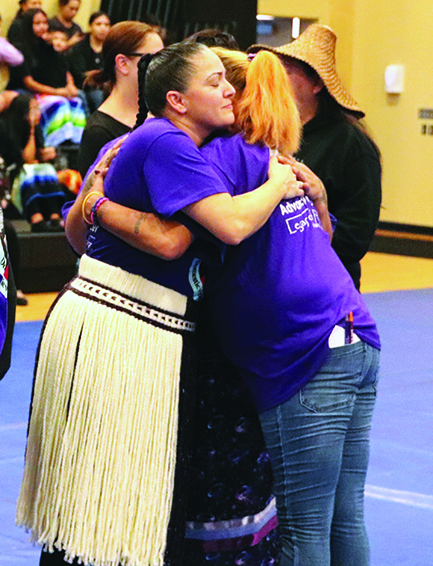
While the people enjoyed their meal, Jade opened the gathering with a few words, and shared some examples of what DV looks like in our community. Following her opening statements, Jade introduced the guest speaker, Malory Simpson. As Malory bravely shared her story, people shed tears upon hearing the years of suffering she endured. An important takeaway from her speech was for the people to see how she has since overcome those past tragedies in her lifetime, especially for those who have recently experienced DV or are currently experiencing it and are struggling to see an end or a way out of their personal situations.
Said Malory, “I feel that it is important for people to hear so they know it’s okay to share their own story. We all heal differently, and this is something that has helped me grow as a person and has helped me to heal from my journey of domestic violence. I hope that after hearing me share my story, people know how healing it is to release that trauma they’re holding on to.”
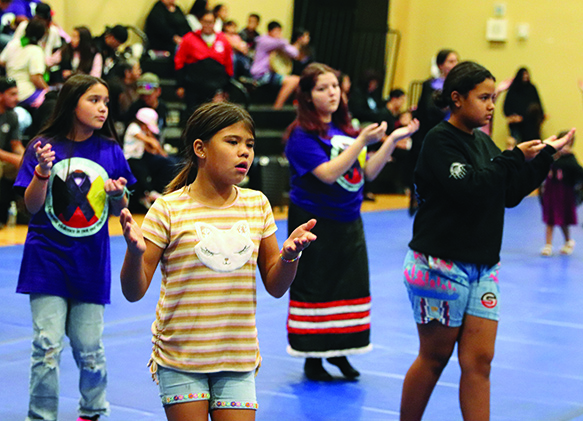
Malory’s words hit home for a few of the community members who have also dealt with abusive relationships. One of those people was none other than Tulalip Chairwoman, Teri Gobin, who then stood up in front of everybody and opened up, for the first time ever, about her past experience with domestic violence. And although the Chairwoman’s confession was shocking and heartbreaking, it was also a powerful moment for onlookers who realized that DV can happen to anybody. And after hearing those two moving testimonies, the people moved forward with the nights work with good hearts and a great deal of solemnity.
Tribal member Princess Jones expressed, “That was healing for me because I am a victim of domestic violence. It was hard for me not to cry in there because I’m not used to people supporting me. I was ashamed to say anything when I got abused. I hid from the cops; I wouldn’t let them take pictures. I hid from our community. But I understand now that the community cares, that our people care, and it’s okay for me to tell my story. Malory’s story was so powerful that Teri got up and shared too, and she let everyone know she never told anybody that before. Just that itself was healing. And so was the entire coastal jam, the songs bring me peace and helps me feel connected to everybody.”
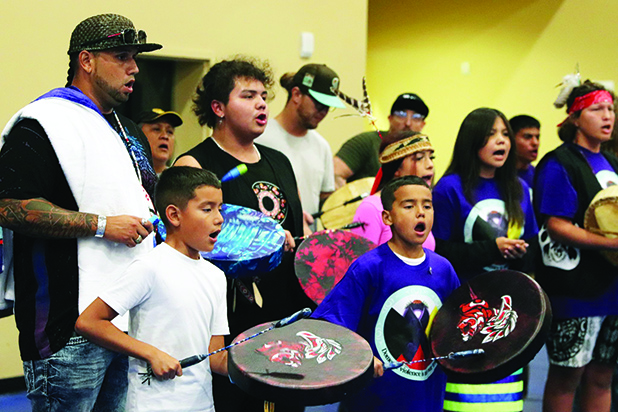
Following the dinner, the coastal jam took place at the Greg Williams Court. It was over three hours of good medicine as singers, dancers, and drummers from Tulalip and other nearby tribes brought healing to the people through culture and practice of the Tribe’s ancestral teachings. Infants, elders, and everyone in between, conducted important healing work through various prayers, dances, and chants during the gathering.
Among the many special moments from the coastal jam, event emcee, Josh Fryberg, called all the survivors and victims of DV to the floor. After taking a moment of silence to pay respect to all those going through a DV situation, the dancers formed a circle around the survivors and the drummers offered a prayer song, wrapping each and every one of them with love and support.
Malory shared, “It was amazing to see the strength in all of those who came to the floor to stand together. I want you all to know that you are not alone and that we all stand with you, just as we did on the floor that night. You are not what has happened to you. We are all worthy of a healthy relationship and that it is still possible. I hope that you know that you are loved and that you are not what your abuser may say that you are. You are beautiful!”
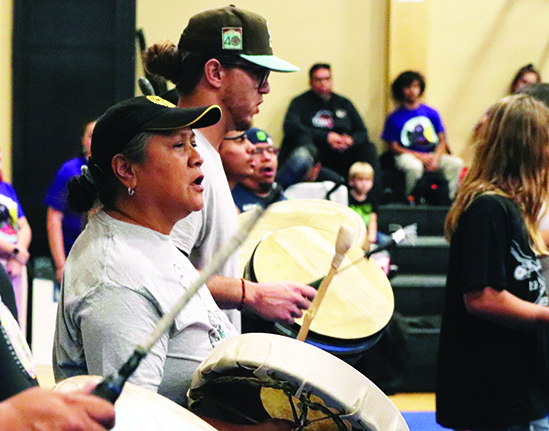
During the coastal jam, a blanket was placed at the center of the floor where people placed cash donations that will go directly to supporting the local survivors and victims of DV. A total of $233 was raised, which can assist a survivor as they transition away from a domestic partnership and begin anew in a safe and good way.
“From what we know, the reason we have these different crimes on our reservation is because it stems from the colonization that’s happened to us as a people,” Jade stated. “I think the healing piece for us is knowing this is not something that stems from us as a people. When you’re going through this process, that’s part of what you’re learning – that it’s not okay. It’s not who we are. It’s not something that comes from us. It’s something that was taught to us.
“Domestic violence is not just physical violence; it is a pattern of behavior in any relationship that is used to gain or maintain power and control over an intimate partner. This can be in the form of threats, intimidation, emotional, verbal, sexual, technological, financial, and stalking are some examples.”
The Legacy of Healing is asking for your assistance in raising awareness throughout the month by participating in their raffle ($5 for 1 ticket/$20 for 5 tickets) in which all of the proceeds go towards supporting survivors of DV. Over 20 prizes will be raffled off at the end of the month including a number gift cards and gift baskets, Xbox games, a ribbon skirt donated by Morning Star Creations, a beaded necklace by Winona Shopbell, beaded earrings by Paige Pettibon and Odessa Flores, and a cedar and abalone headband by Malory Simpson.
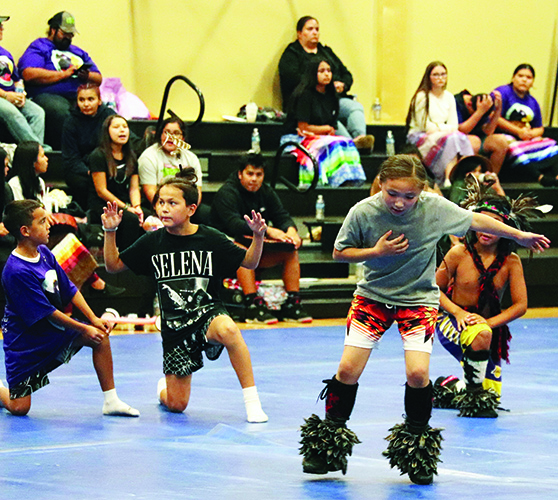
To purchase a raffle ticket, you can catch the Legacy of Healing team and the Tulalip Foundation at the following locations/dates/times:
- 10/16 at the Tulalip Tribal Court from 3:30 p.m. – 4:30 p.m.
- 10/19 on the second floor of the Tulalip Administration building (Carmel apple social) from 11:30 a.m. – 1:30 p.m.
- 10/21 at the Tulalip Resort Casino (Semi-General Council) from 9:00 a.m. – 1:00 p.m.
- 10/31 at the Tulalip Gathering Hall (Employee Halloween Luncheon) from 12:00 p.m. – 2:00 p.m.
If you are looking for additional ways to show your support throughout DV Awareness Month, you can still order your purple dranks, the Unity Elixir or the Violet Hope Lotus, from the café at the Tulalip Administration building, Ti Kupihali.
To help raise awareness within the Tribe’s governmental entity, the Legacy of Healing has been sending out informational e-mails each week of Domestic Violence Awareness Month. This week, the Legacy of Healing’s Victims Advocate, Marisa Chavez, shared:
Here are just a few of the signs that a loved one may be in an abusive relationship:
- A sudden change in clothing style (wearing clothes that cover more skin even when it’s hot out)
- They start to cancel plans more often.
- They have to check with partner before doing things (or anything)
- They seem anxious, paranoid, or depressed.
- They make excuses for their partner’s actions, or they take responsibility for their partner’s actions.
- Their partner puts them down or uses harsh or harmful language with them.
Here are some ways that you can be a support:
- Don’t blame or shame the person for staying in the relationship – Don’t make comments like “just leave him/her” or “I don’t know why you keep going back to him/her.”
- Educate yourself – Did you know that most survivors of DV leave about 7 times before they are totally done with that relationship. In Indian Country, it is closer to 15 times.
- Support their decision – You may not agree with them going back but you can still support and help when they need it.
- Give resources – Offering things such as websites or advocacy centers can be helpful. Legacy of Healing can give you resources to pass on.
- Understand the emotions – Know that they may be anxious, paranoid, have PTSD, or other emotional or mental health struggles because of the abuse. Your patience will go a long way.
- Check in on them – Calling or texting your friend or loved one lets them know that you are there for them and that you care. Ask them to spend time with you, this will help maintain the relationship and trust.
If you or anybody you know is experiencing an abusive relationship, please do not hesitate to call the Legacy of Healing at (360) 716-4100 or assistance. And if you are in a crisis or an emergency situation, the Legacy of Healing provided a list of three additional hotline numbers that you can utilize during your time of need:
- The National Domestic Violence Hotline 1-800-799-SAFE (7233)
- Strong Hearts Native Helpline: 1-844-762-8483
- Domestic Violence Services of Snohomish County 425-25-ABUSE (22873)